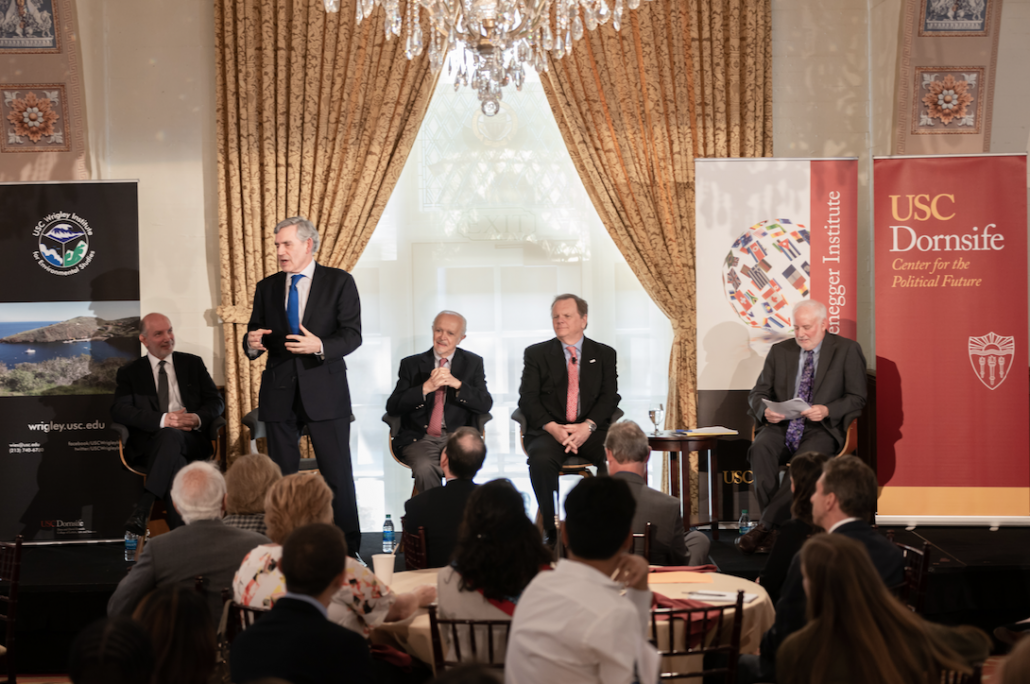Leaders, Nobel Prize winner discuss environmental issues

Town and Gown Hall traveled into the future for several hours on Thursday as Los Angeles mayor Eric Garcetti talked about the city’s plans to completely eliminate emissions within several decades, while guests ate a plant-based lunch and sipped from compostable cups. The air of optimism at the all-day conference, “Climate Forward: The Politics of Climate Change” at USC, was palpable.
Nearly 150 people attended the Global Action panel, moderated by Steven Lamy, director of the Dornsife Task Force for Global and Political Studies. Four panelists who took the stage, including Gordon Brown, former prime minister of the United Kingdom; Ambassador of Mexico to Austria Luis Alfonso de Alba; Terry Tamminem, CEO of the Leonardo DiCaprio Foundation; and Mario Molina, recipient of the 1995 Nobel Prize in Chemistry.
The panel focused on the threat posed by global temperature rises. The Intergovernmental Panel on Climate Change predicts that with current greenhouse gas emissions, global temperatures will rise between 2.5 and 10 degrees Fahrenheit over the next century.
The panelists touched on a plethora of topics, including the rise of the global middle class, air quality and how to cut 50% of global carbon emissions in half by 2030. Brown emphasized the need for governments around the world to inform the public about the climate crisis. The panelists spoke positively about the future of global climate, even as they and audience members raised questions about the challenges of preserving safety and health in the coming years.
“What more do we actually need to make that safety net for the planet that can sustain 10 billion people and a biodiverse world by 2050?” Tamminem said. “It’s all very possible. Ambitious, but possible.”
When Lamy opened up the floor to questions, Kelley Xuereb, a sophomore majoring in international relations, global business and environmental studies, asked the panelists about the ways climate change disproportionately affects the Southern Hemisphere. According to a 2017 study from the American Association for the Advancement of Science, climate change will cause the number of people migrating to the European Union to triple by the year 2100.
“How can we navigate this disparity, the ways that burdens are shared and the increase in migrants by using the international system?” she asked the panelists.
Xuereb said she is currently taking a class on the politics of the global environment, which has exposed her to the political side of the climate crisis.
“I have always loved politics and the environment and finding ways to find the intersection between the two is something that I’m really interested in,” Xuereb said.
In response to Xuereb, de Alba said the majority of countries do not want to be considered victims in a such as massive, inevitable problem.
“We’ve focused too much on mitigation and not enough on adaptation,” De Alba said.
Like Xuereb, many other students attended to see how their interests could play into the global solutions for climate change.
Ankur Rastogi, a senior majoring in computer science, was one of those students. He explained he was drawn to the event because he believes that engineering can be better incorporated into the effort to battle climate change.
“There’s an environmental engineering major in [the Viterbi School of Engineering], but for a lot of other groups, it’s a distant and kind of hazy thing to think about,” Rastogi said. “So I was really excited to learn that the conference was happening because it seemed like an opportunity to … dive into how people are tackling the problem in a really tangible way.”

